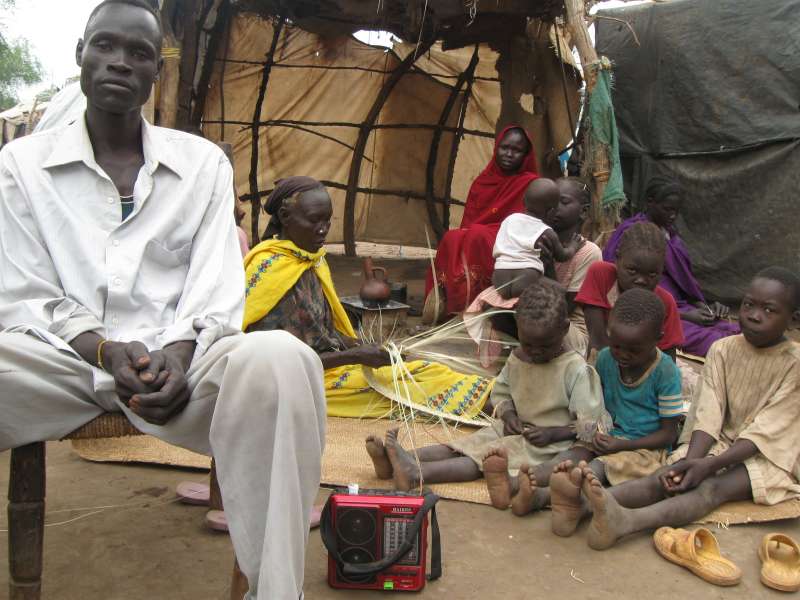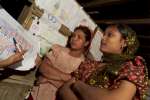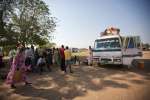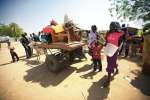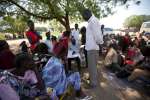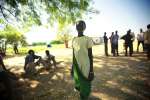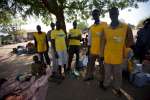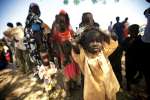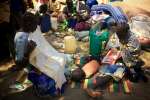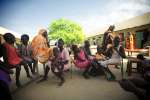Food shortage forces hundreds of refugees back into Sudan
News Stories, 20 May 2014
DORO REFUGEE CAMP, South Sudan, May 20 (UNHCR) – Driven by hunger, hundreds of Sudanese refugees in South Sudan's Maban County have returned to Sudan's war-torn Blue Nile state in a desperate search for food.
"The present food crisis is a product of the insecurity that has been hampering humanitarian operations in many parts of the country," said Cosmas Chanda, UNHCR Representative in South Sudan, adding that up to 2,000 people had gone back across the border from camps affected by food shortages in Maban because of difficulty for UNHCR and its partners in moving aid in amid the current insecurity.
Chanda said he was concerned that the right of asylum would have little meaning if refugees had no food. "We are hopeful that the peace deal signed [on May 9] by President [Salva Kiir] and the leader of the opposition [Riek Machar] will make it possible to rapidly deliver adequate volumes of food by road to refugees and other vulnerable populations in Maban," he added.
In an interview this week with the BBC, President Kiir warned that South Sudan faced one of the "worst famines ever" unless the conflict, which has displaced hundreds of thousands, is ended. The 125,000 refugees in Maban County had fled to South Sudan to escape fighting in Sudan.
Refugees in Maban, like Momen Bashir, are resorting to desperate measures to find food, including forays into Sudan where the Sudanese armed forces continue to fight the rebel SPLM-North. Bashir recently travelled from Doro Refugee Camp to Yabus in the far south of Blue Nile state in the hope of finding employment to earn enough money to feed his family.
"Three days after I arrived in Yabus a bomb exploded," Bashir recalled, adding that he immediately fled back to South Sudan. "I risked my life. Yet I made only 20 [Sudanese] pounds, enough to buy a kilo of flour and a packet of salt."
With aid agencies unable to provide adequate quantities of food, the 30-year-old Bashir said he had felt that, as head of the household, he had to do something to help his family, including his wife, seven children, elderly mother and three aunts.
"As a man, it is my duty to feed my family," he stressed. "People are suffering. If you walk around the camp, you see they are becoming thinner and weaker," Bashir said, telling of a young mother whose weak and hungry child had died while she was out working as a water carrier for a restaurant in the camp.
Bashir's own young children stopped going to school some weeks ago. "I would walk them to school, and within the hour they would return home, unable to cope with learning on an empty stomach," he said, adding wistfully: "I did not have the heart to send them back. They are too young."
The young man said he was embarrassed that his 60-year old mother should spend her days weaving dried grass into mats, to sell at the market. He had hoped that his trip to Yabus would provide a solution, but now he is back where he started.
"We recognize the refugees' predicament," said Adan Ilmi, UNHCR's head of office in Maban County. "They depend largely on food assistance for their survival. We are leaving no stone unturned in the effort to bring food to Maban, including expanding the airstrip for C-130 aircraft to land."
UNHCR is also engaging the refugee leadership to discourage cross-border movements. "There is a constant risk of direct or indirect attack in Blue Nile state," Ilmi said, "and the threat of recruitment by fighting forces, including of children and youth, is ever present."
By Pumla Rulashe in Doro Refugee Camp, South Sudan




